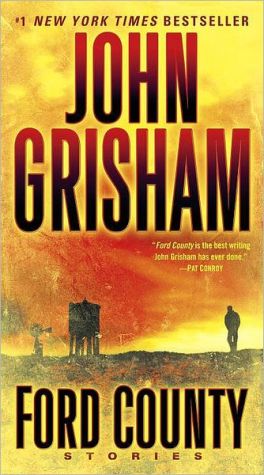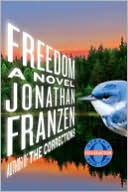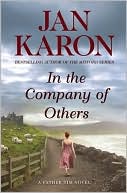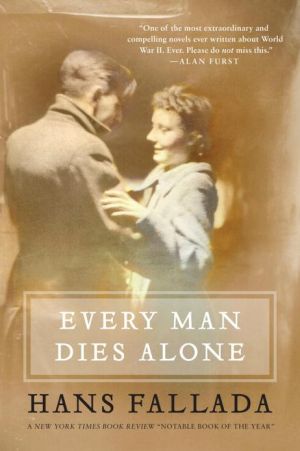Ford County
In his first collection of short stories, John Grisham takes us back to Ford County, Mississippi, the setting of his first novel, A Time to Kill.\ Inez and her two older sons take a road trip to visit the youngest brother, who's locked away on death row\ Mack, a low-grossing divorce lawyer, gets a phone call with an offer to settle some old cases for more money than he has ever seen\ Sidney, a data collector for an insurance company, perfects his blackjack skills in hopes of bringing down the...
Search in google:
John Grisham returns to Ford County, Mississippi, the setting of his immensely popular first novel, A Time to Kill. This wholly surprising collection of stories reminds us once again why Grisham is America s favorite storyteller.The Barnes & Noble ReviewIn the years since his first novel, A Time to Kill, John Grisham said he has often returned to the people and places of that book: "I've had dozens of ideas for Ford County novels, almost all of which peter out for one reason or another...The good stories stick, but they're not always long enough to become novels." His first collection of short fiction, Ford County, collects seven of those tales set in the titular Mississippi region where his characters are "always in the vicinity of trouble." While none of the stories are out-and-out courtroom dramas, most of them are populated with felons, ex-felons, and the kind of lawyers of who are one bad decision away from a jail sentence. In one story, three good ol' boys start driving to Memphis to donate blood for an injured friend, but they're distracted by beer joints and strip clubs along the way. In another, a down-and-out divorce lawyer gets a second chance to make some big money on an old class-action lawsuit. Like his literary predecessors Eudora Welty, Flannery O'Connor, and that other icon from Oxford, Mississippi, William Faulkner, Grisham knows how southerners tick. The characters in Ford County are rendered with great humor and tenderness; even the worst rapscallion and the slimiest scallywag can be loved here in these pages. Ford County may just be Grisham's best book to date. Gone are the problems which have long plagued his novels: paper-thin characters, trite dialogue, and sentences that tangle in a traffic jam of adverbs and adjectives. By winnowing his "ideas" to the shorter form, Grisham has, by necessity, dispensed with the padding and come closer to richer, deeper writing than ever before. --David Abrams
Fetching Raymond\ Mr. McBride ran his upholstery shop in the old icehouse on Lee Street, a few blocks off the square in downtown Clanton. To haul the sofas and chairs back and forth, he used a white Ford cargo van with “McBride Upholstery” stenciled in thick black letters above a phone number and the address on Lee. The van, always clean and never in a hurry, was a common sight in Clanton, and Mr. McBride was fairly well-known because he was the only upholsterer in town. He rarely lent his van to anyone, though the requests were more frequent than he would have liked. His usual response was a polite “No, I have some deliveries.”\ He said yes to Leon Graney, though, and did so for two reasons. First, the circumstances surrounding the request were quite unusual, and, second, Leon’s boss at the lamp factory was Mr. McBride’s third cousin. Small-town relationships being what they are, Leon Graney arrived at the upholstery shop as scheduled at four o’clock on a hot Wednesday afternoon in late July.\ Most of Ford County was listening to the radio, and it was widely known that things were not going well for the Graney family.\ Mr. McBride walked with Leon to the van, handed over the key, and said, “You take care of it, now.”\ Leon took the key and said, “I’m much obliged.”\ “I filled up the tank. Should be plenty to get you there and back.”\ “How much do I owe?"\ Mr. McBride shook his head and spat on the gravel beside the van. “Nothing. It’s on me. Just bring it back with a full tank.”\ “I’d feel better if I could pay something,” Leon protested.\ “No.”\ “Well, thank you, then.”\ “I need it back by noon tomorrow.”\ “It’ll be here. Mind if I leave my truck?” Leon nodded to an old Japanese pickup wedged between two cars across the lot.\ “That’ll be fine.”\ Leon opened the door and got inside the van. He started the engine, adjusted the seat and the mirrors. Mr. McBride walked to the driver’s door, lit an unfiltered cigarette, and watched Leon. “You know, some folks don’t like this,” he said.\ “Thank you, but most folks around here don’t care,” Leon replied. He was preoccupied and not in the mood for small talk.\ “Me, I think it’s wrong.”\ “Thank you. I’ll be back before noon,” Leon said softly, then backed away and disappeared down the street. He settled into the seat, tested the brakes, slowly gunned the engine to check the power. Twenty minutes later he was far from Clanton, deep in the hills of northern Ford County. Out from the settlement of Pleasant Ridge, the road became gravel, the homes smaller and farther apart. Leon turned in to a short driveway that stopped at a boxlike house with weeds at the doors and an asphalt shingle roof in need of replacement. It was the Graney home, the place he’d been raised along with his brothers, the only constant in their sad and chaotic lives. A jerry-rigged plywood ramp ran to the side door so that his mother, Inez Graney, could come and go in her wheelchair.\ By the time Leon turned off the engine, the side door was open and Inez was rolling out and onto the ramp. Behind her was the hulking mass of her middle son, Butch, who still lived with his mother because he’d never lived anywhere else, at least not in the free world. Sixteen of his forty-six years had been behind bars, and he looked the part of the career criminal—long ponytail, studs in his ears, all manner of facial hair, massive biceps, and a collection of cheap tattoos a prison artist had sold him for cigarettes. In spite of his past, Butch handled his mother and her wheelchair with great tenderness and care, speaking softly to her as they negotiated the ramp.\ Leon watched and waited, then walked to the rear of the van and opened its double doors. He and Butch gently lifted their mother up and sat her inside the van. Butch pushed her forward to the console that separated the two bucket seats bolted into the floor. Leon latched the wheelchair into place with strips of packing twine someone at McBride’s had left in the van, and when Inez was secure, her boys got settled in their seats. The journey began. Within minutes they were back on the asphalt and headed for a long night.\ Inez was seventy-two, a mother of three, grandmother of at least four, a lonely old woman in failing health who couldn’t remember her last bit of good luck. Though she’d considered herself single for almost thirty years, she was not, at least to her knowledge, officially divorced from the miserable creature who’d practically raped her when she was seventeen, married her when she was eighteen, fathered her three boys, then mercifully disappeared from the face of the earth. When she prayed on occasion, she never failed to toss in an earnest request that Ernie be kept away from her, be kept wherever his miserable life had taken him, if in fact his life had not already ended in some painful manner, which was really what she dreamed of but didn’t have the audacity to ask of the Lord. Ernie was still blamed for everything—for her bad health and poverty, her reduced status in life, her seclusion, her lack of friends, even the scorn of her own family. But her harshest condemnation of Ernie was for his despicable treatment of his three sons. Abandoning them was far more merciful than beating them.\ By the time they reached the highway, all three needed a cigarette. “Reckon McBride’ll mind if we smoke?” Butch said. At three packs a day he was always reaching for a pocket. “Somebody’s been smokin’ in here,” Inez said. “Smells like a tar pit. Is the air conditioner on, Leon?”\ “Yes, but you can’t tell it if the windows are down.”\ With little concern for Mr. McBride’s preferences on smoking in his van, they were soon puffing away with the windows down, the warm wind rushing in and swirling about. Once inside the van, the wind had no exit, no other windows, no vents, nothing to let it out, so it roared back toward the front and engulfed the three Graneys, who were staring at the road, smoking intently, seemingly oblivious to everything as the van moved along the county road. Butch and Leon casually flicked their ashes out of the windows. Inez gently tapped hers into her cupped left hand.\ “How much did McBride charge you?” Butch asked from the passenger’s seat.\ Leon shook his head. “Nothing. Even filled up the tank. Said he didn’t agree with this. Claimed a lot of folks don’t like it.”\ “I’m not sure I believe that.”\ “I don’t.”\ When the three cigarettes were finished, Leon and Butch rolled up their windows and fiddled with the air conditioner and the vents. Hot air shot out and minutes passed before the heat was broken. All three were sweating.\ “You okay back there?” Leon asked, glancing over his shoulder and smiling at his mother.\ “I’m fine. Thank you. Does the air conditioner work?”\ “Yes, it’s gettin’ cooler now.”\ “I can’t feel a thang.”\ “You wanna stop for a soda or something?”\ “No. Let’s hurry along.”\ “I’d like a beer,” Butch said, and, as if this was expected, Leon immediately shook his head in the negative and Inez shot forth with an emphatic “No.”\ “There’ll be no drinking,” she said, and the issue was laid to rest. When Ernie abandoned the family years earlier, he’d taken nothing but his shotgun, a few clothes, and all the liquor from his private supply. He’d been a violent drunk, and his boys still carried the scars, emotional and physical. Leon, the oldest, had felt more of the brutality than his younger brothers, and as a small boy equated alcohol with the horrors of an abusive father. He had never taken a drink, though with time had found his own vices. Butch, on the other hand, had drunk heavily since his early teens, though he’d never been tempted to sneak alcohol into his mother’s home. Raymond, the youngest, had chosen to follow the example of Butch rather than of Leon.\ To shift away from such an unpleasant topic, Leon asked his mother about the latest news from a friend down the road, an old spinster who’d been dying of cancer for years. Inez, as always, perked up when discussing the ailments and treatments of her neighbors, and herself as well. The air conditioner finally broke through, and the thick humidity inside the van began to subside. When he stopped sweating, Butch reached for his pocket, fished out a cigarette, lit it, then cracked the window. The temperature rose immediately. Soon all three were smoking, and the windows went lower and lower until the air was again thick with heat and nicotine.\ When they finished, Inez said to Leon, “Raymond called two hours ago.”\ This was no surprise. Raymond had been making calls, collect, for days now, and not only to his mother. Leon’s phone was ringing so often that his (third) wife refused to answer it. Others around town were also declining to accept charges.\ “What’d he say?” Leon asked, but only because he had to reply. He knew exactly what Raymond had said, maybe not verbatim, but certainly in general.\ “Said thangs are lookin’ real good, said he’d probably have to fire the team of lawyers he has now so he can hire another team of lawyers. You know Raymond. He’s tellin’ the lawyers what to do and they’re just fallin’ all over themselves.”\ Without turning his head, Butch cut his eyes at Leon, and Leon returned the glance. Nothing was said because words were not necessary.\ “Said his new team comes from a firm in Chicago with a thousand lawyers. Can you imagine? A thousand lawyers workin’ for Raymond. And he’s tellin’ ’em what to do.” Another glance between driver and right-side passenger. Inez had cataracts, and her peripheral vision had declined. If she had seen the looks being passed between her two oldest, she would not have been pleased.\ “ Said they’ve just discovered some new evidence that shoulda been produced at trial but wasn’t because the cops and the prosecutors covered it up, and with this new evidence Raymond feels real good about gettin’ a new trial back here in Clanton, though he’s not sure he wants it here, so he might move it somewhere else. He’s thinkin’ about somewhere in the Delta because the Delta juries have more blacks and he says that blacks are more sympathetic in cases like this. What do you thank about that, Leon?”\ “There are definitely more blacks in the Delta,” Leon said. Butch grunted and mumbled, but his words were not clear.\ “Said he don’t trust anyone in Ford County, especially the law and the judges. God knows they’ve never given us a break.”\ Leon and Butch nodded in silent agreement. Both had been chewed up by the law in Ford County, Butch much more so than Leon. And though they had pled guilty to their crimes in negotiated deals, they had always believed they were persecuted simply because they were Graneys.\ “Don’t know if I can stand another trial, though,” she said, and her words trailed off.\ Leon wanted to say that Raymond’s chances of getting a new trial were worse than slim, and that he’d been making noise about a new trial for over a decade. Butch wanted to say pretty much the same thing, but he would’ve added that he was sick of Raymond’s jailhouse bullshit about lawyers and trials and new evidence and that it was past time for the boy to stop blaming everybody else and take his medicine like a man.\ But neither said a word.
Blood Drive 1Fetching Raymond 65Fish Files 139Casino 205Michaels Room 259Quiet Haven 309Funny Boy 387
\ Janet MaslinMr. Grisham took seven of his unused plot ideas and turned each of them into a sharp, lean tale free of subplots and padding. At an average length of slightly over 40 pages, these narratives are shorter than novellas but longer than conventional short stories. For a fledgling author, this format would be a tough sell; for Mr. Grisham, it's a vacation from whatever grueling work goes into the construction of fully rigged best sellers. The change invigorates him in ways that show up on the page…His novels sometimes moralize; these short stories don't need to because they transform their agendas into pure, vigorous plot.\ —The New York Times\ \ \ \ \ Carolyn SeeSet in a small Mississippi town not unlike the one in which Grisham started practicing law, these seven stories seem so artless that the artlessness turns into an art. They're terrifically charming, if only for this one thing: They start out at a beginning and march straight through to an end. They lack plot twists, literary surprises, authorial showing off…stories that—no matter what your literary scruples—you absolutely can't stop reading.\ —The Washington Post\ \ \ Publishers WeeklyReturning to the setting of his first novel, A Time to Kill, longtime bestseller Grisham presents seven short stories about the residents of Ford County, Miss. Each story explores different themes-mourning, revenge, justice, acceptance, evolution-but all flirt with the legal profession, the staple of (former attorney) Grisham's oeuvre. Fans will be excited to settle back into Grisham's world, and these easily digestible stories don't disappoint, despite their brevity. Full of strong characters, simple but resonant plotlines, and charming Southern accents, this collection is solid throughout; though his literary aspirations may seem quaint, Grisham succeeds admirably in his crowd-pleasing craft while avoiding pat endings or oversimplifying (perhaps best exemplified in "Michael's Room," which finds a lawyer facing the consequences of successfully defending a doctor against a malpractice suit). As always, Grisham balances his lawyerly preoccupations with a deep respect for his undereducated and overlooked characters. \ Copyright © Reed Business Information, a division of Reed Elsevier Inc. All rights reserved.\ \ \ \ \ Library JournalGrisham's (www.jgrisham.com) first collection of short stories, in which he returns to the Ford County, MS, setting of his first novel, A Time To Kill (1989)—also available from Books on Tape and Random Audio—proves his talent beyond the genre of legal thriller. The author himself reads, his Southern accent adding to the authenticity of the characters, including a data collector from an insurance company with an aptitude for blackjack, a man dying of AIDS, and a trio of misfits on a road trip to Memphis. These are just some of the quirky individuals whose stories Grisham expertly weaves together in a crazy-quilt style to create a picture of life in Ford County. Listeners will love it; highly recommended. [See Major Audio Releases, LJ 10/15/09; the Putnam hc, which was published in November 2009, was a New York Times, USA Today, and LJbest seller—the pb will publish in July 2010.—Ed.]—Theresa Stoner, St. Joseph Cty. P.L., South Bend, IN\ \ \ \ \ The Barnes & Noble ReviewIn the years since his first novel, A Time to Kill, John Grisham said he has often returned to the people and places of that book: "I've had dozens of ideas for Ford County novels, almost all of which peter out for one reason or another...The good stories stick, but they're not always long enough to become novels." His first collection of short fiction, Ford County, collects seven of those tales set in the titular Mississippi region where his characters are "always in the vicinity of trouble." While none of the stories are out-and-out courtroom dramas, most of them are populated with felons, ex-felons, and the kind of lawyers of who are one bad decision away from a jail sentence. In one story, three good ol' boys start driving to Memphis to donate blood for an injured friend, but they're distracted by beer joints and strip clubs along the way. In another, a down-and-out divorce lawyer gets a second chance to make some big money on an old class-action lawsuit. Like his literary predecessors Eudora Welty, Flannery O'Connor, and that other icon from Oxford, Mississippi, William Faulkner, Grisham knows how southerners tick. The characters in Ford County are rendered with great humor and tenderness; even the worst rapscallion and the slimiest scallywag can be loved here in these pages. Ford County may just be Grisham's best book to date. Gone are the problems which have long plagued his novels: paper-thin characters, trite dialogue, and sentences that tangle in a traffic jam of adverbs and adjectives. By winnowing his "ideas" to the shorter form, Grisham has, by necessity, dispensed with the padding and come closer to richer, deeper writing than ever before. --David Abrams\ \








